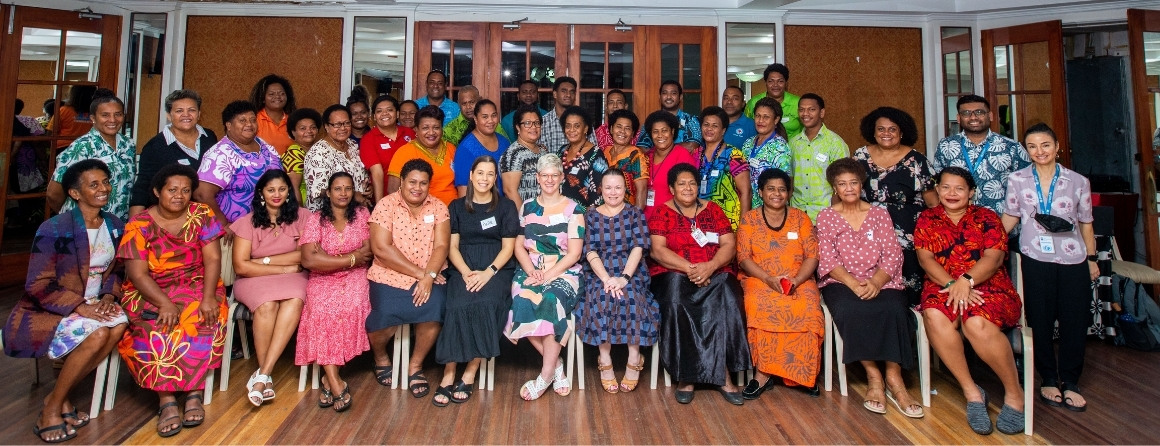Vaccine Champions program
- Immunisation education and training
- Seroprevalence study in Timor-Leste
- Serological surveillance for vaccine preventable diseases in the Western Pacific Region
- Point-of-care testing to determine dengue serostatus: a field evaluation study in Timor-Leste
- Vaccine Champions program
- Guidelines for disease outbreak preparedness and response
- Serosurveillance: Reaching zero-dose children and under-immunised communities in East New Britain, Papua New Guinea project
- Development of a community-based intervention to improve immunisation coverage among children with disability in Fiji
- Determining Streptococcus pneumoniae carriage in children under five in Timor-Leste
- Vaccination behavioural insights research to inform tailored resource development in three Pacific Island Countries
- Reaching Zero-Dose children in the Solomon Islands: Technical assistance for Solomon Islands Ministry of Health and Medical Services Extended Program on Immunisation
Vaccine Champions and Vaccine Communication program: building confidence in COVID-19 vaccination in the Western Pacific Region
Background
The study team designed the Vaccine Champions and Vaccine Communication (VCVC) program at the beginning of the COVID-19 pandemic, with support from the Victorian Department of Health. Recognising that traditional information campaigns or vaccine promotion strategies were unlikely to reach each member of the population, this program was developed to empower healthcare providers, community, faith and industry leaders to become vaccine advocates or ‘Vaccine Champions’. The program empowers Vaccine Champions to discuss and promote the COVID-19 vaccination program and address misinformation to build confidence in COVID-19 vaccines.
Although the COVID-19 vaccine rollout has commenced in most countries in the Western Pacific Region (WPR) with some success, vaccine uptake remains sub-optimal. Towards the end of 2021, multiple countries in the WPR requested help from ARIA to provide technical assistance to support vaccine acceptance. Broad and tailored community engagement and communication approaches are needed to address vaccine access and acceptance issues to increase and sustain vaccine uptake. As such, this project will bring the VCVC program to the WPR, which will be adapted to the local context through co-design and community engagement approaches, to train locals to become Vaccine Champions in their communities.
By enabling evidence-based interpersonal communication through the establishment of a trained Vaccine Champions network, community engagement can occur to increase local confidence in COVID-19 vaccines, and establish a framework for promotion of other vaccines in the future.
Aim
This project aims to improve COVID-19 vaccination uptake in key priority groups, build confidence in vaccines and address misinformation through provision of technical expertise to train and empower Vaccine Champions, strengthen community engagement and improve vaccine communication at all levels of immunisation service delivery.
Additional goals include:
- Work with local stakeholders to tailor the VCVC program to key priority groups and identify barriers to COVID-19 and routine vaccination
- Deliver culturally responsive VCVC training on COVID-19 and routine vaccines and effective communication strategies to empower local Vaccine Champions to strengthen vaccine confidence, acceptance and demand, and address misinformation in the WPR
- Support Vaccine Champions for a three-month period to deliver their own information and engagement sessions within their communities
- Evaluate the reach, effectiveness, adoption, implementation, and maintenance of the VCVC program with stakeholders, including trained champions and community members.
Method
The current VCVC program features 90–120 minute session about COVID-19 vaccine safety, effectiveness, and risk communication. It provides guidance on how to engage with people who are vaccine-hesitant in person, in online forums, through social media and in healthcare environments.
This health intervention involves co-designing and adapting the VCVC program with key stakeholders to be relevant to the local context, including the issues surrounding routine vaccinations. It also involves training Vaccine Champions to deliver the adapted VCVC Program, and supporting the Vaccine Champions over three-months to deliver sessions to their communities.
Location
The project will be conducted in two countries in the WPR over 18 months, starting with Fiji and Tonga.
Impact
In Australia, more than 80 people who participated in the training have become clinical, community and faith, or industry and workplace vaccine champions, supported by the Victorian Department of Health. These champions have run over 100 sessions to provide training and advocacy in their own communities and workplaces to build vaccine confidence, guide individuals towards trustworthy sources of information and encourage vaccine uptake. By using local community empowerment and peer-communication strategies, the VCVC program is likely to have a similar impact in the WPR region.
Project team
Principal investigator: Associate Professor Margie Danchin (Chair, COSSI and MCRI)
Study team: Dr Jessica Kaufman (MCRI), Belle Overmars (MCRI) Professor Julie Leask (University of Sydney), Associate Professor Holly Seale (UNSW), Kylie Jenkins (consultant)
Images

Video
A video higlighting The Vaccine Champions Program in action, training community leaders in Fiji.
For more information, please email the ARIA secretariat.
